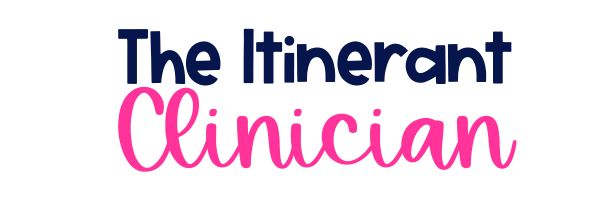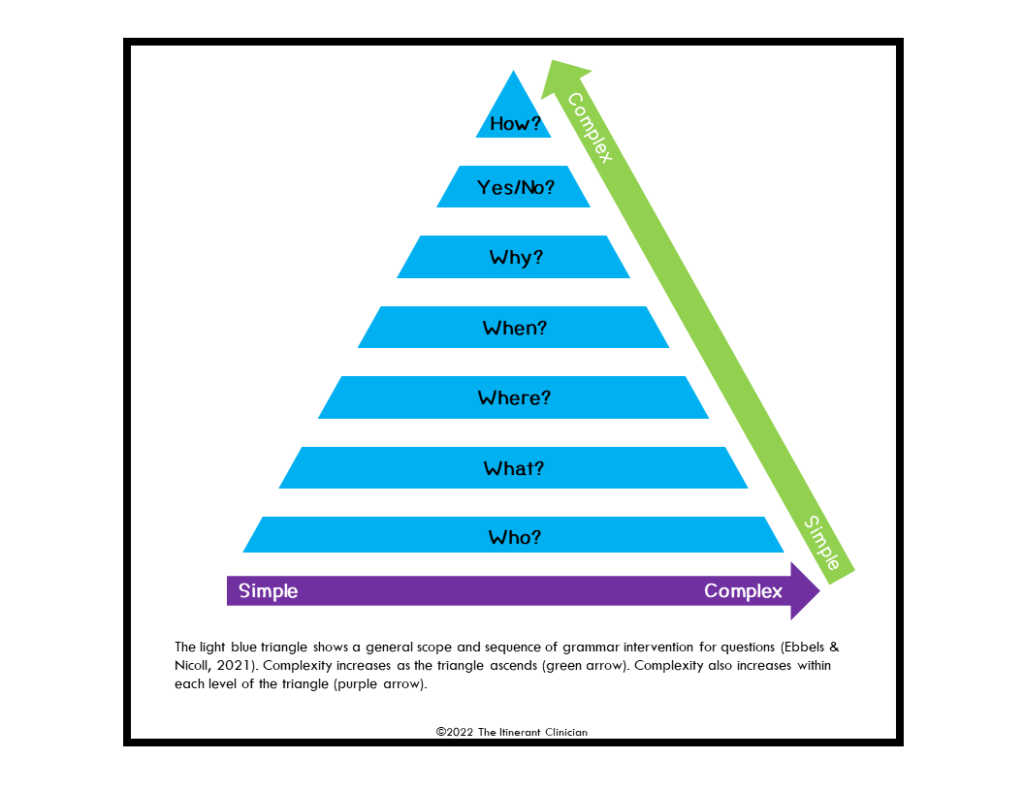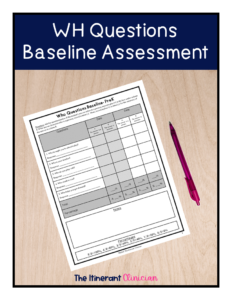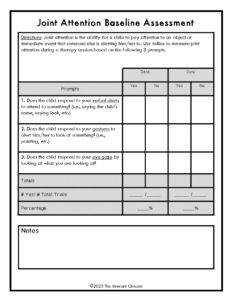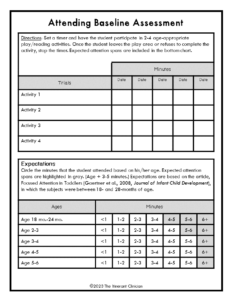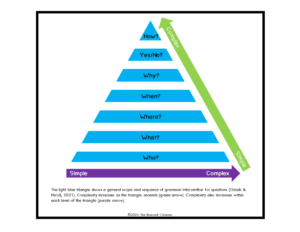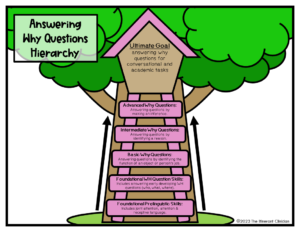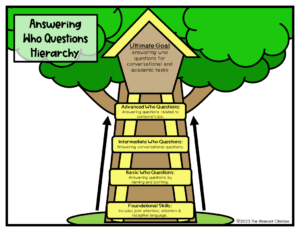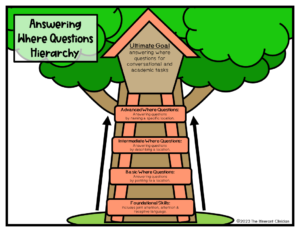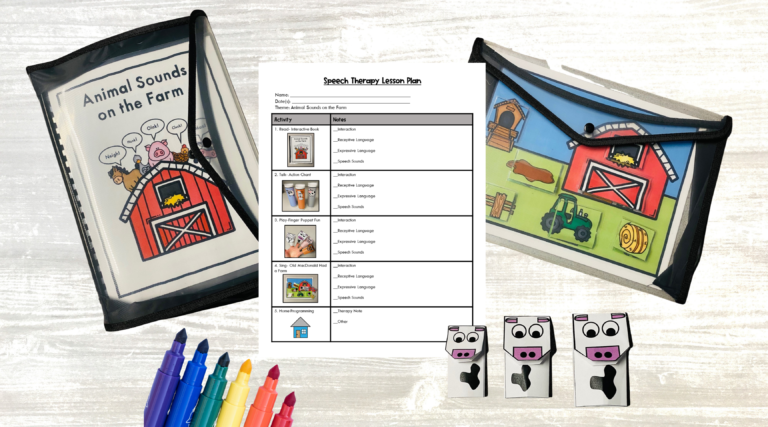Sharing is caring!
In speech therapy, WH questions can be a challenge for many special education students. Before writing speech therapy goals and objectives, there are 4 things you should consider.
This post will give you the following information for writing goals that are individualized for each of your students.
- Does my student have adequate prelinguistic skills needed for answering WH questions in speech therapy?
- What is typical WH question development?
- Am I using a WH question test diagnostic tool?
- Where can I find an intervention hierarchy for speech therapy WH questions?
If you would rather skip right to the good stuff, grab your FREE WH Questions Baseline Assessment. This will help you report IEP data and find a starting point for therapy intervention.
Question 1. Does my student have adequate prelinguistic skills for answering WH questions in speech therapy?
Before you jump into answering WH questions in speech therapy, be aware of prelinguistic skills that set a foundation for being able to answer questions.
Prelinguistic Skill 1: Joint Attention
Joint attention is the ability of an adult and child to focus on the same object or event. Joint attention is a crucial skill for learning the language that is associated with a referent object or event, which is important for learning vocabulary that is associated with answering WH questions.
Unsure of your students’ joint attention skills? Use this prelinguistic baseline assessment to collect data and write IEP goals.
If your students show deficits with this prelinguistic skill, here is a possible joint attention speech therapy goal to target.
Receptive Language Prelinguistic Goal: The student will demonstrate joint attention in 8/10 trials when the adult points to/shows an object or talks about an immediate event (something that is happening in the child’s present environment).
Prelinguistic Skill 2: Attention Span
Attention span is important because it is a basic prerequisite for learning. If a child isn’t attending long enough for learning to occur, understanding language, in general, is going to be difficult.
I use the attention span by age indicated for 18- to 28-month-olds in the article Focused Attention in Toddlers (Gaertner et al., 2008, Journal of Infant Child Development) as my guide. Although most of my students are a bit older, I use their age + 3-5 minutes for judging their focused attention.
Difficulties with joint attention and attention span tend to go hand-in-hand. Suppose a student cannot maintain attention to a task. In that case, chances are he or she is not paying attention to what you are pointing to or showing him or her, let alone listening to the language that goes with that object or event. This leads to decreased vocabulary and background knowledge, which is a critical component of answering questions.
Measure your students’ attention spans by using this baseline assessment.
If your students are showing an attention span that is reduced, you might need to work on increasing attention span length. Here is an attention goal for speech therapy.
Receptive Language Prelinguistic Goal: The student will attend to a reading and/or play activity for ___ minutes with minimal adult support in 4/5 trials.
Prelinguistic Skill 3: Receptive Language
Children need a strong foundation in receptive language skills in order to understand WH questions. Sometimes when a child with a significant receptive language disorder is asked a question, he or she might not even realize a question is being asked. For example, a child might demonstrate echolalic behaviors or might not give a response at all. This is a HUGE red flag which indicates the child can’t understand words to help him/her complete question comprehension tasks.
If this is the case, you might just need to focus on receptive language goals through play. There are numerous toys, songs, and books that include basic WH questions for beginners. Here is a possible goal if this is the treatment path you choose.
Receptive Language Goal: The student will respond to WHO, WHAT, and/or WHERE questions during a play activity in 8/10 trials by pointing.
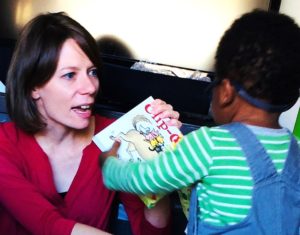
I’ve also used focused implicit instruction (which is a term I coined) for students with significant communication delays. Children with receptive language delays are typically unable to understand explicit instruction, in which the skill is explained. Focused implicit instruction involves focusing the child’s attention on several trials of a target skill, with minimal environmental distractions.
For example, I might use simple flashcards that require only a point to answer a question. Every flashcard repeats the same target WH question word, as well as the same grammatical structure. Here is a goal that I write for students who do well with this type of learning.
Receptive Language Goal: The student will respond to WHO, WHAT, and/or WHERE questions by pointing when one or two picture choices are presented with 80% accuracy.
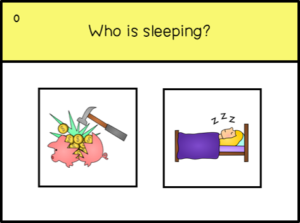
Question 2: What is typical WH question development?
When planning WH question speech therapy goals, it is important to keep in mind normal WH question development. Here are the norms that I use from the resource Guide to Communication Milestones (Lanza, J. R. & Flahive, L. K., 2012).
Early WH Question Development:
- Nonverbally answers simple WHO and WHERE questions (through the use of eye gaze): 1-2 years of age.
- Verbally answers simple WHAT questions (i.e., What’s this?): 1-2 years of age.
- Answers WHO, WHAT, and WHERE questions logically: 2-3 years of age.
WHO Questions:
- Answers simple WHO Questions (i.e., Who is this?): 2-3 years of age.
- Answers more complex WHO questions (i.e., Who puts out fires?): 3-4 years of age.
WHAT Questions:
- Answers simple WHAT questions (i.e., What’s this?): 1-2 years of age.
- Points to objects when described (i.e., What do you wear on your feet?): 2-3 years of age.
- Verbally answers questions about functions of objects (i.e., What are scissors used for?): 3-4 years of age.
WHERE Questions:
- Looks in the direction of a person/object when asked a WHERE question (i.e., Where’s your blanket?): 1-2 years of age.
- Answers by pointing to the location of a person/object/picture: 1-2 years of age.
- Verbally answers WHERE questions: 2-3 years of age.
- Answers complex WHERE questions (i.e., Where do you buy food?): 3-4 years of age.
WHEN Questions:
- Answers WHEN questions: 4 years of age.
WHY Questions:
- Answers WHY questions about the functions of objects (i.e., Why do we have eyes?): 3-4 years of age.
- Answers more complex WHY questions logically: 3-4 years of age.
Question 3: Am I using a WH question test diagnostic tool?
Determining goals and planning intervention depends upon knowing where to start your instruction. Using an informal WH question test to determine a starting point and collecting data is a must.
Not sure where to start with your intervention for WH questions? Are you looking for an informal baseline assessment tool to help you determine your students’ abilities to answer wh questions? Download my FREE WH Questions Baseline Assessment tool today!
Question 4: Where can I find an intervention hierarchy for speech therapy WH questions?
If the student has foundational communication skills mastered, it’s time for you to teach WH questions using specific grammar goals in speech therapy. Once you have your informal WH question test completed, use this scope and sequence of grammar intervention (Ebbels, S., & Owen Van Horne, A., 2020) when planning your therapy.
What’s next?
Now that you know the 4 things to consider before targeting speech therapy WH questions, it’s time to learn how to teach WH questions. Check out the following posts for some practical strategies to use with your WH question intervention plan.
- How to teach WHO questions for speech therapy.
- WHAT questions speech therapy intervention.
- How to teach WHERE questions for speech therapy.
- How to teach WHEN questions for speech therapy.
And if you didn’t already grab your FREEBIE, click on the picture below to get your WH Questions Baseline Assessment now!
References:
Ebbels, S., & Owen Van Horne, A. (2020). Grammatical concepts of English: Suggested order of intervention. The Informed SLP. https://www.theinformedslp.com/review/the-grammar-guide-you-never-knew-you-always-wanted
Gaertner et al., (2008) Focused Attention in Toddlers: Measurement, Stability, and Relations to Negative Emotion and Parenting. Journal of Infant Child Development. https://www.ncbi.nlm.nih.gov/pmc/articles/PMC2607062/pdf/nihms-81608.pdf
Lanza, J. R. & Flahive, L. K. (2012) Guide to Communication Milestones. LinguiSystems. (https://www.carolinatherapeutics.com/wp-content/uploads/milestones-guide.pdf)
